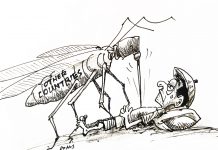
ASSOCIATE PROFESSOR III
Vote buying in elections is a persistent and pervasive issue that has an impact on the level of democracy and governance in the nation. Vote buying, in the opinion of some academics, dates back to the colonial era, when the American and Spanish monarchies utilized coercion and patronage to win the support of the populace’s elites and masses.
However, after democracy was restored in 1986 and political parties and candidates began to compete for votes in a widely dispersed and individualized electoral system, vote buying increased in frequency and became more organized.
Some of the historical factors that have contributed to the persistence of vote buying in the Philippines are:
• Poverty and inequality: Many Filipino voters are poor and vulnerable to economic inducements, especially during times of crisis or hardship. Vote buying provides them with a short-term relief or benefit, while also reinforcing their dependence on political patrons.
• Patronage politics: Philippine politics is dominated by local clans, dynasties, and machines that rely on clientelist networks and personal loyalties to mobilize support. Vote buying is one of the ways that these political actors maintain their power and influence, by rewarding their followers and enticing new ones.
• Weak enforcement of laws: The legal framework against vote buying is inadequate and ineffective, as it is often ignored or circumvented by both the perpetrators and the enforcers. The Commission on Elections (Comelec) lacks the resources and capacity to monitor and prosecute vote buying cases, while the courts are slow and lenient in delivering justice.
• Lack of voter education: Many Filipino voters are not well-informed or aware of their rights and responsibilities as citizens, or of the consequences of vote buying for their welfare and development. They also lack access to alternative sources of information or platforms for participation, which would enable them to make informed and independent choices.
These factors have created a culture of vote buying that is deeply entrenched and difficult to eradicate. However, there have been some efforts and initiatives to combat vote buying in the Philippines, such as:
• Anti-vote buying campaign: The Comelec has launched a Committee on Kontra Bigay, an inter-agency task force that aims to prevent and reduce vote buying incidents through information dissemination, complaint handling, investigation, and prosecution.
• Civil society advocacy: Various civil society organizations have been active in promoting voter education, empowerment, and vigilance, as well as monitoring and reporting vote buying activities. Some examples are Namfrel, PPCRV, Lente, Kontra Daya, and Bantay Balota.
• Social media mobilization: Social media platforms have been used by some citizens and groups to expose and denounce vote buying schemes, as well as to encourage others to reject or resist them. Some examples are #NoToVoteBuying, #IwasanAngBotohan, and #NotForSale.
These efforts have shown some positive results in raising awareness and reducing tolerance for vote buying in the Philippines. However, they also face some challenges and limitations, such as:
• Lack of coordination and cooperation: The different actors involved in combating vote buying have different agendas, strategies, and capacities, which may lead to duplication, inconsistency, or conflict. There is a need for more collaboration and integration among them to achieve greater impact.
• Resistance and backlash: The political actors who benefit from vote buying have various means to counter or undermine the anti-vote buying campaign, such as intimidation, harassment, bribery, or manipulation. They also have a strong hold on their supporters and communities, which makes it hard to change their behavior or attitude.
• Sustainability and scalability: The anti-vote buying campaign requires a lot of resources, commitment, and participation from various stakeholders, which may not be available or sustained over time. It also needs to reach a critical mass of voters who are willing and able to reject vote buying, which may not be feasible or realistic given the social and political context.
In conclusion, vote buying in Philippine elections is a complex and persistent problem that has historical roots and contemporary manifestations. It poses a serious threat to the integrity and quality of democracy and governance in the country. However, there are also some efforts and initiatives that aim to prevent or reduce vote buying through various means. These efforts need to be supported and strengthened by all concerned parties, especially the voters themselves. Only then can the Philippines achieve a truly free and fair electoral system that reflects the genuine will of the people.
So have we perfected the art of vote buying in the Philippines? The answer is yes!



